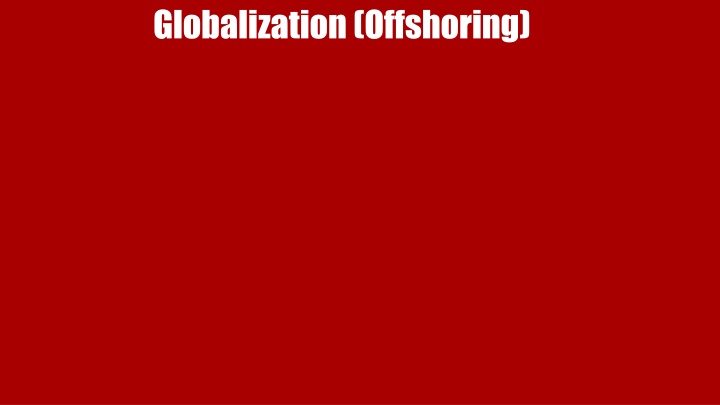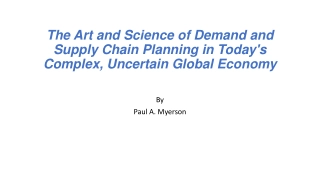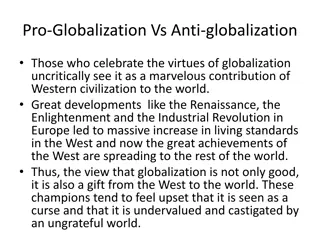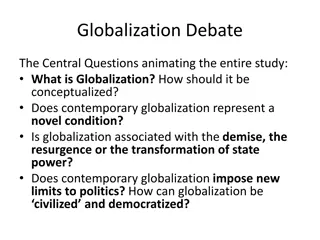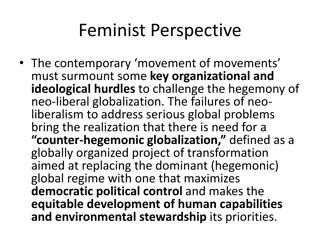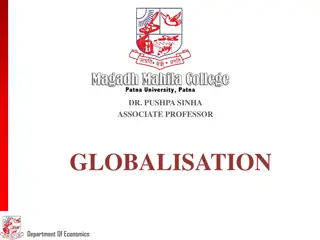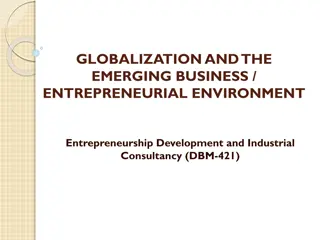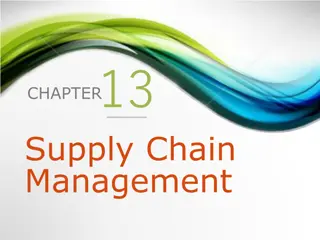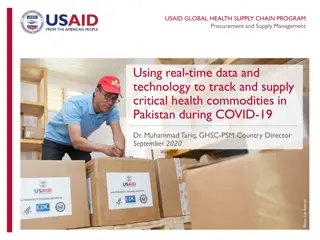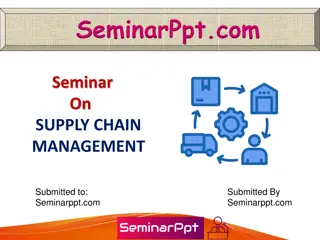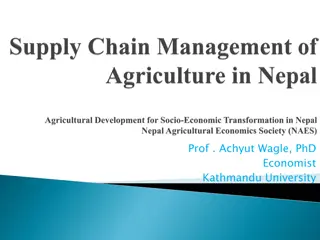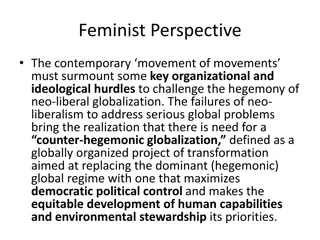Globalization and Offshoring in Supply Chain Management
The concept of globalization and offshoring in supply chain management is explored, highlighting opportunities, challenges, and potential solutions. The interconnected network of enterprises involved in delivering products globally, along with considerations for offshoring locations, is discussed. Cultural and legal challenges are addressed, and strategies such as transportation cost optimization and postponement are suggested as solutions. The importance of adhering to local regulations and the potential advantages of adapting to local cultures are also emphasized.
Download Presentation

Please find below an Image/Link to download the presentation.
The content on the website is provided AS IS for your information and personal use only. It may not be sold, licensed, or shared on other websites without obtaining consent from the author.If you encounter any issues during the download, it is possible that the publisher has removed the file from their server.
You are allowed to download the files provided on this website for personal or commercial use, subject to the condition that they are used lawfully. All files are the property of their respective owners.
The content on the website is provided AS IS for your information and personal use only. It may not be sold, licensed, or shared on other websites without obtaining consent from the author.
E N D
Presentation Transcript
Supply Chain & Globalization The supply chain for an organization is the network of enterprises that the organization uses to deliver products to the consumer. It includes the organization itself, its suppliers and suppliers of its suppliers, any down steam operations that may process the products further, and distributors, wholesalers, retailers, and transportation systems. Supply Chain does not include competitors. Global supply chain or global operations management is when the chain expands over more than one country. Globalization in supply chain is often called offshoring , which is a supply chain strategy that involves moving part of the supply chain processes to a foreign country. There are Opportunities, Challenges, and Solutions. Offshoring Location Considerations, A. Asef-Vaziri, Systems & Operations Management 2
Globalization Opportunities Broader market More customer Less stringent regulations Local government incentives Lower costs Lower labor costs Lower raw materials costs Less indirect labor costs (managers, purchasing staff, security guards, etc.) Lower taxes and tariffs Lower logistics cost for international customers Offshoring Location Considerations, A. Asef-Vaziri, Systems & Operations Management 3
Globalization Challenges Language and Culture Changes in currency values Standards Voltages, outlets Metric system Regulations Host government policy Labor norms Working hours Political Stability Offshoring Location Considerations, A. Asef-Vaziri, Systems & Operations Management 4
Some Solutions Solutions Transportation Costs - International customers & Domestic customers Third party logistics (3PL). Outsource logistics (distribution, warehousing, and fulfillment services) to a third party The original company does not need to own warehouse or transport facilities 3PL may have better related knowledge, greater expertise and more global networks to ensure greater time and cost efficiencies Postponement Leave some customization actives to a later time. HP s printer packaging postponement strategy Global production + pack language manuals & electrical connectors in local distribution centers Offshoring Location Considerations, A. Asef-Vaziri, Systems & Operations Management 5
Some Solutions Culture Challenge Solution: cultural transferability Culture of a country impacts foreign companies doing business in that country. Burger King s cultural transferability strategy: Add taco to its menu in Mexico Add sushi to its menu in Japan Legal Challenge Solutions follow local regulations. International companies need to observe and follow local regulations and laws Will Globalization/Offshoring Always Be the Best Choice? May or May Not Be There are tradeoffs between opportunities and challenges Offshoring Location Considerations, A. Asef-Vaziri, Systems & Operations Management 6
Questions 1. While selecting a factory location in a foreign country, consideration should be given to A. Culture B. Legal system C. Monetary policies D. Transportation infrastructure E. All answers are correct 2. Which of the following represent reasons for global operations? A. To gain improvements in the supply chain B. To improve operations C. To expand a product's life cycle D. To attract and retain global talent E. All answers are correct Offshoring Location Considerations, A. Asef-Vaziri, Systems & Operations Management 7
Questions 3. McDonald s includes beer in its menu for German franchises. This is an example of which of the following considerations for global operations: A. Cultural transferability B. Network development C. Host government policy D. Labor norms E. All answers are correct 4. Which of the following is a risk of global operations management? A. Intellectual rights issues B. Contract compliance issues C. Quality issues D. Sustainability issues E. All answers are correct Offshoring Location Considerations, A. Asef-Vaziri, Systems & Operations Management 8
Questions 5. Which of the following is not an exclusive characteristic of global supply chains in comparison to domestic operations: A. Language and cultural differences B. Currency fluctuations C. Increase transportation costs and lead times D. Increase need for trust and cooperation among supply chains partners E. Technological advances in telecommunications 6. Which of the following is a factor that drives the globalization of operations and supply chain management? A. Availability of low-cost, high-quality labors in foreign countries B. Growth in foreign-market demand C. Advances in communication and transportation technology D. Penetration of foreign companies into local markets E. All answers are correct Offshoring Location Considerations, A. Asef-Vaziri, Systems & Operations Management 9
Questions 7. The network model of the physical goods supply chain contains all but one of the following elements. A. Competitor B. Distributor C. Retailer D. Customer E. Supplier 8. Which of the following represents reasons for globalizing operations? A. Gain improvements in supply chain B. Improve operations C. Expand product life cycle D. Attract and retain global talent E. All answers are correct Offshoring Location Considerations, A. Asef-Vaziri, Systems & Operations Management 10
Questions 9. Multinational organizations can shop from country to country and cut costs through A. Lower wage scales B. Lower indirect labor costs C. Less stringent regulations D. Lower taxes and tariffs E. All answers are correct 10. Offshoring is a global operations strategy that involves moving processes to another country. Which of the following statement related with offshoring is true? A. Firms can reduce labor costs by outsourcing processes to low labor-cost countries B. Firms can reduce the logistical costs of delivering products to international customers by offshoring C. Firms can avoid tariffs by assembling the products in other countries rather than exporting them D. Offshoring may not be the best choice, even if local labor wages far exceed those of other countries E. All answers are correct Offshoring Location Considerations, A. Asef-Vaziri, Systems & Operations Management 11
